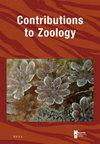Shell and appendages variability in two allopatric ostracod species seen through the light of molecular data
IF 2.1
2区 生物学
Q1 ZOOLOGY
引用次数: 7
Abstract
Ostracod crustaceans are among the most abundant microfossil animals. Understanding intra- and interspecific variability of their shell is of pivotal importance for the interpretation of paleontological data. In comparison to appendages, ostracod shell displays more intraspecific variability (in shape, size, and ornamentation), often as a response to environmental conditions. Shell variability has been studied with sophisticated methods, such as geometric morphometrics (GM), but the conspecificity of examined specimens and populations was never tested. In addition, there are no GM studies of appendages. We build on previously published high cytochrome c oxidase subunit I (COI) divergence rates among populations of a brackish water species, Ishizakiella miurensis (Hanai, 1957). With landmark-based GM analyses of its shell and appendages, and additional genetic markers (ITS, 28S, 18S), we test if the genetic variability is structured in morphospace. This approach is the core of integrative taxonomy paradigm which has been proposed to bring the gap between traditional taxonomy and other disciplines such as evolutionary biology. The results show that it is the shell shape, and not the shape of appendages, that mirrors the molecular phylogeny, and we describe a new species. Our results suggest that the landmark-based GM studies may be useful in paleontological datasets for closely related species delineation. We implement molecular clock and population statistics to discuss speciation processes and phylogeography of the two congeners in Korea and Japan.从分子数据的角度看两种异域介形虫的壳和附属物变异
介形甲壳类动物是最丰富的微化石动物之一。了解其壳的种内变异性和种间变异性对古生物资料的解释至关重要。与附属物相比,介形虫的壳表现出更多的种内变异性(形状、大小和纹饰),通常是对环境条件的反应。人们已经用几何形态计量学(GM)等复杂的方法研究了贝壳的可变性,但从未测试过被检查标本和种群的同一性。此外,没有关于附属物的转基因研究。我们建立在先前发表的高细胞色素c氧化酶亚基I (COI)分化率在半咸淡水物种,石崎氏菌miurensis (Hanai, 1957)。通过对其外壳和附属物以及其他遗传标记(its, 28S, 18S)进行基于里程碑的转基因分析,我们测试了遗传变异性是否在形态空间中结构。该方法是整合分类学范式的核心,旨在弥补传统分类学与进化生物学等其他学科之间的差距。结果表明,是壳的形状,而不是附属物的形状,反映了分子系统发育,我们描述了一个新的物种。我们的研究结果表明,基于里程碑的转基因研究可能对古生物数据集中密切相关的物种描述有用。我们运用分子钟和种群统计方法,讨论了韩国和日本两个同系物的物种形成过程和系统地理。
本文章由计算机程序翻译,如有差异,请以英文原文为准。
求助全文
约1分钟内获得全文
求助全文
来源期刊

Contributions to Zoology
生物-动物学
CiteScore
4.00
自引率
4.50%
发文量
16
审稿时长
>12 weeks
期刊介绍:
Contributions to Zoology solicits high-quality papers in all systematics-related branches of comparative zoology (including paleozoology). Preference will be given to manuscripts dealing with conceptual issues and to integrative papers (e.g., ecology and biodiversity, morphology and phylogeny and character state evolution, phylogeny and historical biogeography, systematics and bioinformatics, bioinformatics and biodiversity, habitat disturbance and biogeography, etc.). Reviews and alpha-taxonomic contributions are considered for publication, but acceptance will depend on their high quality and exceptional nature.
 求助内容:
求助内容: 应助结果提醒方式:
应助结果提醒方式:


